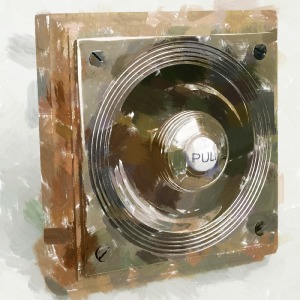 Bramblings is a quietly tasteful double-fronted Edwardian house at the bottom of a short, wooded drive. The (deliberately) imposing front door sports one of those nifty bells that you ring by grabbing a big brass knob marked PULL and yanking it enthusiastically until someone appears, hissing, ‘I heard you the FIRST time …’.
Bramblings is a quietly tasteful double-fronted Edwardian house at the bottom of a short, wooded drive. The (deliberately) imposing front door sports one of those nifty bells that you ring by grabbing a big brass knob marked PULL and yanking it enthusiastically until someone appears, hissing, ‘I heard you the FIRST time …’.
So I did that.
I’d been forewarned about Mrs Jenkins by three separate people: Maggie, Norman Ruskin and William Burdock up at the garage. Each said it in a slightly different way, but all said essentially the same thing: ‘She’s a fine woman, once you get to know her, but can be a bit – well – abrupt, shall we say?’ (That was the Ruskin version.)
She’d been the housekeeper for the previous incumbent of Bramblings – “Old Commander Wingfield” as he was invariably referred to – and seemed, as far as any one could work out, to have been included in the sale along with all the other fixtures and fittings like the oven range and the built-in laundry press. Dressed carefully in muted tones and aged somewhere between 60 and 80, she was of medium height, medium weight and medium build and wore her hair pulled back into a slightly messy bun.
And she was hissing at me.
‘I heard you the FIRST time.’
‘Sorry. I couldn’t hear anything happening, so I wasn’t sure it was working.’ I tried my most charming smile. ‘I have an interview with Professor Pilch – Pilger.’
‘Yes. He’s expecting you.’ Everso-slightly stony-faced, she stepped back to let me in. ‘If you’d care to wait in the Library, I’ll let him know you’re here.’
Shooing me into a wood-paneled room off the main hallway, she closed the door – a little bit too pointedly, I felt – and I heard her footsteps echoing off into the bowels of the house. As silence fell, I took stock of my surroundings.
For a library, it was a bit lacking in books. Plenty of bookcases, of the floor to ceiling variety, but not a single book anywhere in sight. I prowled around a bit and eventually located three lonely strays, discarded in a corner. One was a 1967 edition of The Friendship Book of Patience Strong, the second a battered and much-thumbed Fanny Craddock cookery book and the third a 1971 Beano Annual. They looked a bit forlorn.
So far, so weird.
It was a handsome room though – high ceilinged and well-proportioned in that understated ‘look how much money I have’ way the Edwardian middle-classes perfected. Pity about the books though.
I heard returning footsteps and scooted across the room to stand innocently in the bay window, admiring the view of an old corrugated iron garage and a compost heap.
‘The Professor will see you now.’
As she led me across the hall and down a passageway, I was struck by how similarly we were dressed – sensible shoes, long-sleeved, calf-length dress, cardigan, hair tied back and no jewellery. I’d thought I was modelling myself on Jane Eyre, but as I passed a full-length mirror, I realized I looked rather more like the mad Mrs Danvers in Rebecca. Not exactly what I was aiming at, but neverthless enough to obliterate any similarity to the harpy in the Post Office who’d accused him of being an arrogant sod.
She ushered me into a room which really should have been called ‘The Library’ since it was full of books. I had the unfortunate thought that it might be The Pantry, which triggered an inappropriate lop-sided smirk at precisely the wrong moment – just as Professor Pilger was turning in his chair to stand and greet me.
‘Something amuses you?’ He sort of loomed at me from on high. Although now slightly stooped with age, he was still broad-shouldered and stood well over six feet. In his prime he must have been a giant.
‘It’s nerves. Sorry.’
He harrumphed, and waved me to a seat – then picked up the CV and letter that I’d sent him.
‘On paper, you look good. Is it all true.?’
Charming as ever, then.
‘Yes.’ I felt my hackles starting to rise. ‘It is.’
‘So what are you doing here? You could be earning a respectable living in somewhere like London’
‘I could be developing ulcers and high blood pressure, too. I prefer not to.’
He considered that for a moment, apparently decided it was a reasonable answer and tapped the CV.
‘If I raised these references, what would they say?’
‘Probably that I’m honest, articulate and competent.’
If I was lucky, I thought, what they wouldn’t say was that I was lippy, cantankerous and tactless.
‘Hmph. That’s what Norman Ruskin told me too.’ He put the papers down and handed me a shorthand pad and pencil. ‘ We’ll see. You know that I’m writing a book on gastropods?’
‘The Reverend Ruskin told me, yes.’
‘I’ll dictate some of my notes to you and then you can go and transcribe them over there …’ He indicated a table in the window, upon which sat a typewriter: a real, old-fashioned typewriter with a carriage return lever and a fabric ribbon. I didn’t say a word, although I think one eyebrow may have quivered very slightly.
I’d barely settled down with the pad and pencil before he launched into a piece about the mating habits of slugs – which was so completely and distractingly unlikely that I almost forgot to write it down, so hypnotized was I by the sexual peculiarities of gastropods. Who knew?
I came briefly unstuck as I dithered over the proper outline for ‘hermaphrodite’ but in the end managed to get something on paper for every word and then wandered over to the museum piece on the table to bash it out.
I’d forgotten how much effort it took to pound the keys on a manual typewriter. It’s like driving a car without power steering after you’ve grown used to guiding two tons of steel around country lanes with little more than your forefinger and thumb: entirely too much like hard work. Two broken nails later, I ripped the paper from the machine with a satisfying FRRIIIPPP (you can’t do that with a modern printer) and handed the result to him.
He read it. He read it again. Then he brushed a long strand of silver grey hair from his forehead and looked up at me as if weighing something in the balance. Finally, he named an hourly rate of pay. It wasn’t overly generous, but it wasn’t entirely miserly either.
I sat down again and tried not to appear too eager.
‘How many hours a week?’
‘As and when, to suit. It depends on where I am in the book.’
‘When would you want me to start?’
‘Next week? I need to get organized. You can work in the Library.’
‘The one without books.’
‘Wingfield agreed to include them in the sale, but the auctioneers didn’t get the message – or claimed they didn’t.’
‘Ah.’ I cast my eye over the books that surrounded us. ‘So these are …’
‘My own. Do you want the job?’
There wasn’t really much doubt about that. H M Revenue and Customs wanted blood and – in any case – I needed to know more about the sex life of snails.
‘I do.’ I was tempted to add, ‘Till death us do part’, but managed to control myself.’
‘And you can start on Monday? At 10.00am? We’ll give you lunch.’
I stood up and we shook hands. I decided that Norman was right. Professor Pilger really was okay, when you got to know him a little. I smiled.
‘Monday is fine. I’ll be here.’
He walked me to the front door and then, as I turned to say a final ‘Goodbye’ to him, pinioned me with a dark grey eye.
‘By the way …’
‘Yes?’
‘I’d be obliged if you didn’t call me an arrogant sod again.’
‘Oh. Yes. Righty-ho. Fair enough.’
So much for the Vicar’s cunning plan.
